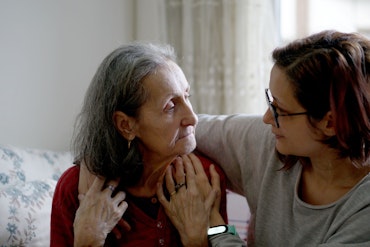Peak body says appropriate use of drugs ‘must continue to be a focus’
One aged care peak body is hitting back following recent media attention around the inappropriate or unsafe medication of older people, highlighting that appropriate medication is a key element of high quality aged care.

Aged care peak body says ‘highlighting that appropriate medication is a key element of high quality aged care’ (Source: Shutterstock)
Leading Age Services Australia (LASA) Chief Executive Officer (CEO) Sean Rooney commented on the article (Aged-care homes’ drug use slammed as ‘elder abuse’) that was published last week in The Australian, saying that it is a quality of care issue and one that all Australians would be rightly concerned about.
He says medication is an important component of care both for clinical conditions and due to other conditions, such as dementia, but highlights that vigilance is required to ensure appropriate and safe outcomes for people in residential aged care with these challenges.
“Appropriate medication is a key element of aged care standards and is reviewed as part of accreditation reviews,” he says.
“Along with our Members, we support a multi-disciplined approach to ensuring there is safe and appropriate medication management within residential aged care, with any use of medications also meeting community expectations about the rights of older people.
“Older people with dementia and mental illness can have challenging behaviours that may put themselves or others at risk.
“GPs prescribing medications must ensure that these are appropriate and safe and need to consult care plans, the patient and family, as appropriate, when making prescribing decisions.
“Appropriate use of drugs must continue to be a focus of the quality and accreditation system, with continuous improvement.”
Mr Rooney also refers to the new Aged Care Quality and Safety Commission, which commences on 1 January 2019, and the new quality standards commencing on 1 July 2019 which he says will cover chemical restraint issues.
He says the new standards will be person-centred, focusing more on outcomes for residents rather than provider processes, adding that it offers “scope for clinical review” of these issues and continuous improvement.
The Australian Medical Association (AMA) has echoed the sentiments around the issue shared by LASA, with AMA President Dr Tony Bartone saying appropriate medication can have a “huge impact” on the older person’s quality of life.
“Polypharmacy – the use of multiple medicines – can cause cognitive impairment, delirium, frailty, increase the chance of falls, and mortality to name a few,” Dr Bartone explains.
“The AMA believes having registered nurses available 24 hours a day in residential aged care facilities is a critical way to ensure older people’s needs are properly met and medicines are administered when appropriate.
“The AMA [also] strongly believes older members of our community should have the same choice of medical care as the rest of the population and deserve to live in an environment that allows them to age with their health and dignity intact.
“Many older people living in residential aged care have high care needs and so require regular and timely medical attention.
“Appropriate medication older people is also for the benefit of the health system.
Polypharmacy increases the number of visits to emergency, and medicine-related hospital admissions cost billions of dollars each year.”
Dr Bartone also says the AMA welcomes the new quality standards, which set out good principles for aged care services, adding that there are concerns that the guidance material is “not clear” on how the standards will be measured and does not regulate for minimum nursing requirements in residential aged care facilities.























